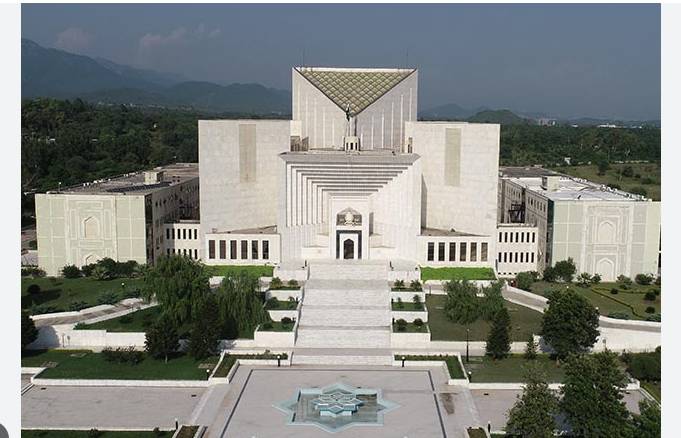Defence Ministry’s lawyer submits more arguments in military trials case
Justice Mandokhel asks whether any May 9 convict incited army personnel against institution: Justice Hilali questions whether altercation with soldier at checkpoint merits military trial: Justice Rizvi asks whether any army personnel was tried in connection with May 9 incidents: Says entry of people in Jinnah House is security breach: Justice Mandokhel remarks ATA more stringent than Army Act: Adds proving collaboration from inside army must for referring cases for military trials

Stay tuned with 24 News HD Android App

Justice Jamal Mandokhel on Tuesday said the question was under what circumstances a civilian could be tried in a military court as Khawaja Haris, the counsel for the Ministry of Defence, continued his arguments during the hearing of intra-court appeals filed against declaring the trials of civilians in military courts null and void, reported 24sHD TV channel.
A seven-member constitutional bench of the Supreme Court (SC), headed by Justice Aminuddin Khan, heard the appeals.
Haris said any person stopping the army personnel from performing his duties or inciting him against the institution’s high command would be tried under the Army Act. “The SC has ruled in the past that retired personnel will be deemed to be civilians,” he added.
Addressing Haris, Justice Mandokhel said all his arguments were based on the FB Ali case. “In that case, both serving and retired army officers had been nominated.”
The question was, he went on to say, whether there was any allegation against any convict in the May 9 case that he or she stopped the Pakistan Army personnel from performing their duties or incited them against the institution’s top brass. “A civilian can only be tried in a military court when the army personnel complains against him,” the judge opined.
Disagreeing with Justice Mandokhel, Haris said whoever violated the army’s discipline would be tried in a military court.
The judge asked whether an attack on the army’s convoy would be deemed to have violated the institution’s discipline.
Justice Musarrat Hilali asked if a civilian arguing with a soldier at a checkpoint would also violate the army’s discipline.
Addressing Haris, Justice Mandokhel remarked, “The way you are broadening the scope of the Army Act, it could cover anything.”
Justice Hassan Azhar Rizvi said that the FB Ali case dated back to a period when there was martial law in the country. “Late prime minister Zulfikar Ali Bhutto was a civil martial law administrator then.”
Haris said that those people who were tried in military courts in FB Ali case were retired army officers. “And the SC has declared in one of its verdicts in the past that retired army personnel are civilians,” the counsel added.
Haris was of the view that even in times of peace, there would be military trials of civilians in case they interfered in the discharge of functions by the army personnel.
The counsel went on to say that military trials were not a sudden development. “The law exists since 1967,” he added.
Justice Rizvi asked whether any army officer was tried in a military court in connection with the May 9 cases.
Haris said, “No my lord, no army officer has been tried.”
Justice Rizvi questioned, how did unarmed civilians manage to reach the core commander’s house in Lahore on May 9?
The very fact, the judge added, that people entered the house was a security failure.
The lawyer said an army could not fight without ‘discipline’. “And if somebody interferes in the discharge of functions by the army personnel, it will also amount to a violation of the discipline,” Haris argued.
Justice Mandokhel remarked that the Anti-Terrorism Act was more stringent than the Army Act. “There is no leniency in the Act for terrorists.”
What FB Ali had been accused of, the judge added, was that he had been in touch with the people in the institution who acted as partners in his crime. “Proving collaboration from within the army is necessary,” he opined.
Then addressing Haris, Justice Mandokhel asked him to inform the bench of the support May 9 convicts received from the people inside the institution. “Khawaja sab, I and you are on good terms with each other. But that does not mean we have collaborated with each other in an offence.”
“What you have to show is whether we both were involved in the crime committed or not. This is a very important point. Please note it down,” Justice Mandokhel said to Haris.
Justice Hilali remarked that on May 9 people had no idea where they were heading.
The court then adjourned the case’s hearing until tomorrow.
Khawaja Haris will continue his arguments even tomorrow.
Reporter: Amanat Gishkori
